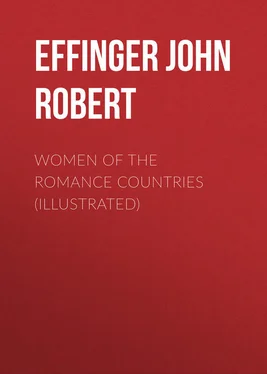John Effinger - Women of the Romance Countries (Illustrated)
Здесь есть возможность читать онлайн «John Effinger - Women of the Romance Countries (Illustrated)» — ознакомительный отрывок электронной книги совершенно бесплатно, а после прочтения отрывка купить полную версию. В некоторых случаях можно слушать аудио, скачать через торрент в формате fb2 и присутствует краткое содержание. Жанр: История, foreign_antique, foreign_prose, на английском языке. Описание произведения, (предисловие) а так же отзывы посетителей доступны на портале библиотеки ЛибКат.
- Название:Women of the Romance Countries (Illustrated)
- Автор:
- Жанр:
- Год:неизвестен
- ISBN:нет данных
- Рейтинг книги:4 / 5. Голосов: 1
-
Избранное:Добавить в избранное
- Отзывы:
-
Ваша оценка:
- 80
- 1
- 2
- 3
- 4
- 5
Women of the Romance Countries (Illustrated): краткое содержание, описание и аннотация
Предлагаем к чтению аннотацию, описание, краткое содержание или предисловие (зависит от того, что написал сам автор книги «Women of the Romance Countries (Illustrated)»). Если вы не нашли необходимую информацию о книге — напишите в комментариях, мы постараемся отыскать её.
Women of the Romance Countries (Illustrated) — читать онлайн ознакомительный отрывок
Ниже представлен текст книги, разбитый по страницам. Система сохранения места последней прочитанной страницы, позволяет с удобством читать онлайн бесплатно книгу «Women of the Romance Countries (Illustrated)», без необходимости каждый раз заново искать на чём Вы остановились. Поставьте закладку, и сможете в любой момент перейти на страницу, на которой закончили чтение.
Интервал:
Закладка:
Far different from this little princess was Maria of Sicily, a woman of many charms, but vain and inconstant, and satisfied with the frivolities of life. Indeed, it must be said that it is solely on account of her love for the poet Boccaccio, after her marriage to the Count of Artois, that she is known to-day. Boccaccio had journeyed to the south from Florence, as the fame of King Robert's court had reached him, and he was anxious to bask in its sunlight and splendor, and to bring to some fruition his literary impulses, which were fast welling up within him. And to Naples he came as the spring was retouching the hills with green in 1333, and there he remained until late in the year 1341, when he was forced to return to his home in the north. His stay in Naples had done much for him, though perhaps less for him personally than for his literary muse, as he plunged headlong into the mad whirlpool of social pleasures and enjoyed to the utmost the life of this gay court, which was enlivened and adorned by the wit of men and the beauty of women. Not until the Easter eve before his departure, however, did he chance to see the lady who was to influence to such a great degree his later career. It was in the church of San Lorenzo that Boccaccio saw Maria of Sicily, and it was a case of love at first sight, the coup de foudre that Mlle de Scudéry has talked about; and if the man's word may be worthy of belief under such circumstances, the lady returned his passion with an equal ardor. It was not until after much delay, however, that she was willing to yield to the amorous demands of the poet, and then she did so in spite of her honor and her duty as the wife of another. But this delay but opened the way for an endless succession of gallant words and acts, wherein the art of coquetry was called upon to play no unimportant part. Between these two people there was no sincere friendship such as existed later between Boccaccio and Joanna, and they were but playing with the dangerous fire of passion, which they ever fanned to a greater heat.
Philippa the Catanese, as she is called in history, stands for the spirit of intrigue in this history; and well she may, as she has a most wonderful and tragic history. The daughter of a humble fisherman of Catania in Sicily, she had been employed by Queen Violante, the first wife of Robert, in the care of her infant son, the Duke of Calabria. Of wonderful intelligence for one in her station, gifted beyond her years, and beautiful and ambitious, she won the favor of the queen to such a degree that she soon became her chief attendant. Her foster-child, the Duke of Calabria, who tenderly loved her, married her to the seneschal of his palace and appointed her first lady in waiting to his wife; and thus it happened that she was present at the birth of Joanna, and was the first to receive her in her arms. Naturally enough, then, King Robert made her the governess and custodian of the small duchess after her father's death. This appointment of a woman of low origin to so high a position in the court gave offence to many of the highborn ladies there, and none could understand the reason for it all. Many dark rumors were afloat, and, although the matter was discussed in undertones, it was the general opinion that she had been aided by magic or sorcery, and the bolder spirits said that she was in daily communication with the Evil One. However that may be, she was faithful to her trust, and it was only through her too zealous scheming in behalf of her young mistress that she was brought to her tragic end.
As the two children, Andreas and Joanna, grew up to maturity, it became more and more apparent that there was no bond of sympathy between them. Andreas had as his preceptor a monk named Fra Roberto, who was the open enemy of Philippa, and her competitor in power. It was his constant aim to keep Andreas in ignorance and to inspire him with a dislike for the people of Naples, whom he was destined to govern, and to this end he made him retain his Hungarian dress and customs. Petrarch, who made a second visit to Naples as envoy from the pope, has this to say of Fra Roberto: "May Heaven rid the soil of Italy of such a pest! A horrible animal with bald head and bare feet, short in stature, swollen in person, with worn-out rags torn studiously to show his naked skin, who not only despises the supplications of the citizens, but, from the vantage ground of his feigned sanctity, treats with scorn the embassy of the pope." King Robert saw too late the mistake he had committed, as the sorrow and trouble in store for the young wife were only too apparent. To remedy, so far as was in his power, this unhappy condition of affairs, he called again a meeting of his feudal lords; and this time he had them swear allegiance to Joanna alone in her own right, formally excluding the Hungarians from any share in the sovereign power. While gratifying to the Neapolitans, this act could but excite the enmity of the Hungarian faction under Fra Roberto, and it paved the way for much intrigue and much treachery in the future.
When King Robert died in 1343, Joanna became Queen of Naples and Provence at the age of fifteen; but on account of her youth and inexperience, and because of the machinations of the hateful monk, she was kept in virtual bondage, and the once peaceful court was rent by the bitterest dissensions. Through it all, however, Joanna seems to have shown no special dislike to Andreas, who, indeed, was probably innocent of any participation in the scheming of his followers; Petrarch compares the young queen and her consort to two lambs in the midst of wolves. The time for Joanna's formal coronation was fixed for September 20, 1345, and some weeks before, while the palace was being decorated and prepared for this great event, the young couple had retired to the Celestine monastery at Aversa, some fifteen miles away. Joanna, who was soon to become a mother, was much benefited by this change of scene, and all was peace and happiness about them, with nothing to indicate the awful tragedy which the future held in store. On the night of September 18th, two days before the coronation was to take place, Andreas was called from the queen's apartment by the information that a courier from Naples was waiting to see him upon urgent business. In the dark corridor without, he was at once seized by some person or persons whose identity has never been made clear, who stopped his mouth with their gloves and then strangled him and suspended his body from a balcony. The cord, however, was not strong enough to stand the strain, and broke, and the body fell into the garden below. There the assassins would have buried it upon the spot, if they had not been put to flight by a servant of the palace, who gave the alarm.
This deed of violence gave rise to much suspicion, and the assertion is often made that Joanna had at least connived at her husband's unhappy end. Indeed, there is a story-which is without foundation, however-to the effect that Andreas found her one day twisting a silken rope with which it was her intention to have him strangled; and when he asked her what she was doing, she replied, with a smile: "Twisting a rope with which to hang you!" But it is difficult to believe the truth of any of these imputations. If she were cruel enough to desire her husband's death, and bold enough to plan for it, she was also intelligent enough to execute her purpose in a manner less foolish and less perilous to herself. Never, up to this time, had she given the slightest indication of such cruelty in her character, and never after that time was the slightest suspicion cast upon her for any other evil act. How, then, could it be possible that Andreas had been murdered by her order? Whatever the cause of this ferocious outbreak, the Hungarian faction, struck with consternation, fled in all directions, not knowing what to expect. The next morning Joanna returned to the castle Nuovo, where she remained until after the birth of her son. During this period of confinement, she wrote a letter to the King of Hungary, her father-in-law, telling him what had taken place. In this epistle she makes use of the expression:
Читать дальшеИнтервал:
Закладка:
Похожие книги на «Women of the Romance Countries (Illustrated)»
Представляем Вашему вниманию похожие книги на «Women of the Romance Countries (Illustrated)» списком для выбора. Мы отобрали схожую по названию и смыслу литературу в надежде предоставить читателям больше вариантов отыскать новые, интересные, ещё непрочитанные произведения.
Обсуждение, отзывы о книге «Women of the Romance Countries (Illustrated)» и просто собственные мнения читателей. Оставьте ваши комментарии, напишите, что Вы думаете о произведении, его смысле или главных героях. Укажите что конкретно понравилось, а что нет, и почему Вы так считаете.












